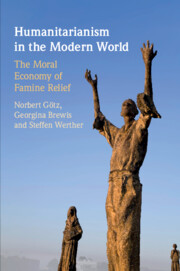Humanitarianism in the Modern World
This is a history of famine relief and humanitarianism. The authors apply a moral economy approach to shed new light on the forces and ideas that motivated and shaped humanitarian aid during the Great Irish Famine, the famine of 1921–2 in Soviet Russia, and the 1980s Ethiopian Famine. They place these episodes within a distinctive periodisation of humanitarianism which emphasises the correlations with politico-economic regimes: the time of elitist laissez-faire liberalism in the nineteenth century as one of ad hoc humanitarianism; that of Taylorism and mass society from c. 1900–70 as one of organised humanitarianism; and the blend of individualised post-material lifestyles and neo-liberal public management since 1970 as one of expressive humanitarianism. The book as a whole shifts the focus of the history of humanitarianism from the imperatives of crisis management to the pragmatic mechanisms of fundraising, logistics on the ground, and accounting.
Norbert Götz is a professor at the Institute of Contemporary History at Södertörn University, Sweden. He is the author of Ungleiche Geschwister (2001), for which he has been awarded the Hans Rosenberg Memorial Prize, and Deliberative Diplomacy (2011).
Georgina Brewis is an associate professor at University College London. Her previous publications include A Social History of Student Volunteering (2014), English Teachers in a Postwar Democracy (2014), and The World of UCL (2018).
Steffen Werther is an associate professor at the Institute of Contemporary History at Södertörn University, Sweden. He is the author of SS-Vision und Grenzland-Realität (2012).

